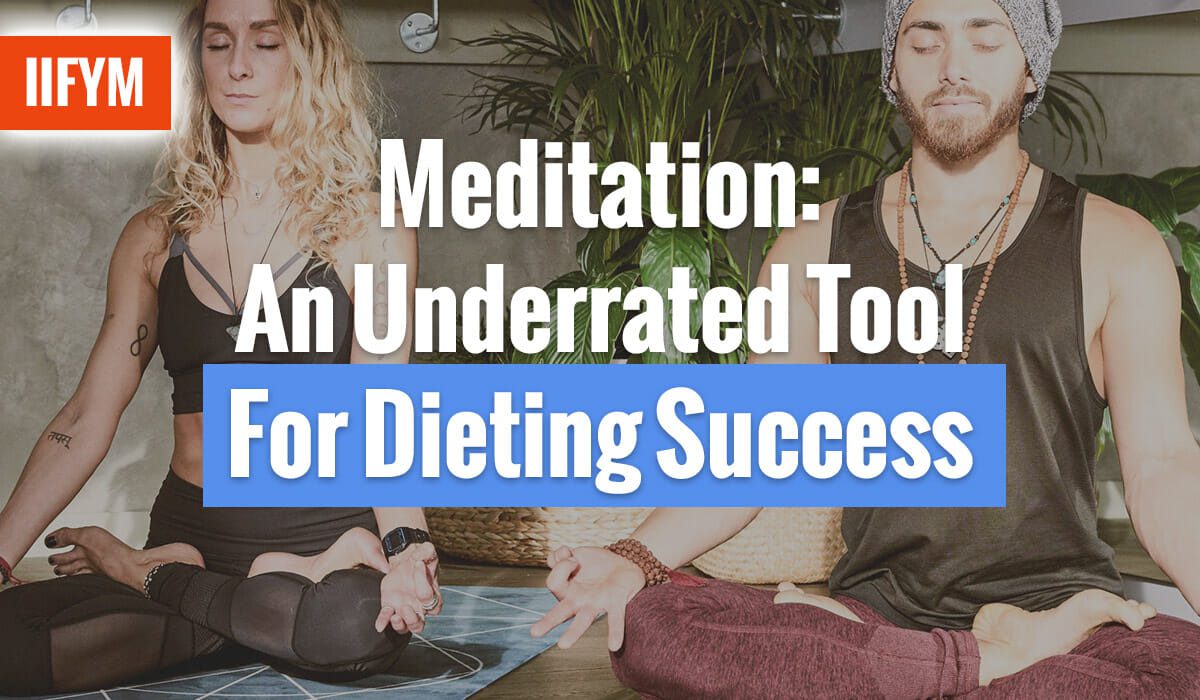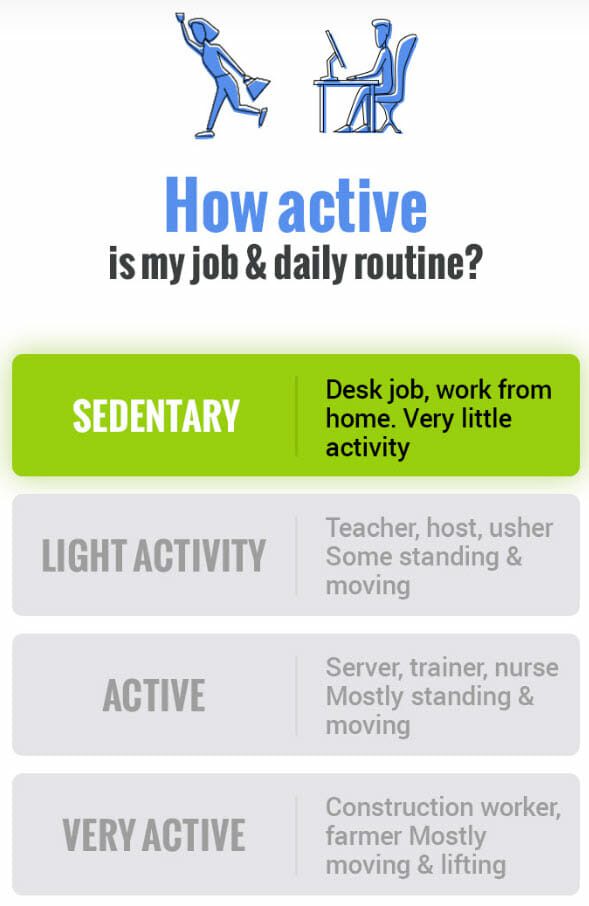So you have now calculated your macro numbers from the macro calculator here on IIFYM and you have begun following all the necessary steps to your new weight-loss plan. However, you’re beyond stressed at work and it’s taking a toll on your motivation to follow through will all of your hard work and research.
IIFYM knows that life can be challenging and stressful, but the main goal is that you find success with what you’re doing. Meditation and mindfulness can be a great tool to add to your tool belt along with all the wonderful IIFYM programs we have to offer.
The Mind and Body
The human body was designed to move and endure the challenges of everyday life. The more you work on your body, the more the body will give back to you in the form of strength, stamina, and endurance.
The human mind is similar: the more work and focus you put in maintaining the health and wellness of the mind, the more benefits you will see in return. In order to tap into what the mind can really do, you need to do the opposite of what you would do with the body: Quiet the mind and eliminate excess thought.
The world we live in is very fast paced. We are constantly being stimulated by social media, digital devices, and computer screens. Practicing mindfulness and meditation can give you mental focus and stamina to keep up with your body.
Meditation has been widely practiced among the yoga community for thousands of years and lately it has started to make its way into other areas of health and wellness. Many corporate and educational settings have used meditation as a tool to promote mental and emotional wellness.

Man feeling freedom on open sea
What are the benefits of meditation
#1 Reduces Stress
When the body is under threat, it releases adrenaline that increases your heart rate and cortisol which increases your blood sugar. Your body uses adrenaline to increase blood flow to your heart to increase your energy supplies and the added cortisol increases the glucose in your bloodstream to help with tissue repair. [1]
Both of these phenomena are great for the body to experience if you find yourself in a life-or-death situation because when the threat goes away the hormone level will return to normal.
Like if you are being chased by a bear. However, if your bear is a metaphor for work pressure and problems at home, then your stressor never goes away. You are constantly being chased by a bear and your hormones never return to normal.
Effects of Stress on the Body
Being under constant stress can cause a whole host of health problems, including weight gain, memory problems, headaches, digestive problems and increases in anxiety and depression. Which is why meditation can be so helpful in reducing your stress levels.
Dr. Herbert Benson, professor, author, cardiologist, and founder of Harvard’s Mind/Body Medical Institute coined the term Relaxation Response, which uses meditation to encourage your body to switch out of fight or flight and into rest and digest mode.
Meditation encourages the brain to release chemicals that tell your body to slow down and increase more blood flow to the brain, allowing the body to relax and relieve stress. [5]
#2 Weight-loss
Stress can be incredibly counterproductive to our weight-loss goals. Increased levels of cortisol have been shown to cause higher insulin levels and lower blood sugar; both of these can lead to craving high-calorie foods.
After asking 400 participants questions about mindfulness, he noticed that people with lower levels of mindfulness were 34% more obese than people who scored higher. [4]
Eating can be a stress reliever because the chemicals released while eating fatty and sugary foods can combat the symptoms of stress. [1]
Therefore, that could conclude that those who have less stress also have fewer cravings for junk food. Because meditation can lower stress levels in the body, it can certainly become one of your tools for weight-loss.

Weight Loss and Mindfulness
Eric Loucks is leading a study about mindfulness and weight loss at Brown University. He found that people who practice mindfulness tended to have less body fat. Loucks thinks that is because we are hardwired from the early days of man to eat as much as we can while it’s available.
This is due to us not knowing when our next meal will come, Loucks believes we haven’t yet evolved out of that human trait. So, when we are in the presence of fats, sugars, and salts, we might not know when to stop, especially when we are under stress.
Our mind and body will crave more of these items because it thinks they we require more nutrients. However, those who are more mindful are more aware of why they are eating. Whether they are truly hungry or they can stop, helping them recognize if they need more (macro) nutrients.
After asking 400 participants questions about mindfulness, he noticed that people with lower levels of mindfulness were 34% more obese than people who scored higher. [4]
Increase your Awareness
Meditation teaches us mindfulness so we can become those people who can decide if they really need that cupcake or our bodies are actually just asking us for something else. People who practice meditation can also practice mindful eating.

This is where you notice how you feel before, during, and after eating to determine if you are full, satisfied, and properly can digest the food you have eaten. Practicing meditation can increase your awareness of how you feel in your own body and allow you to not only lose weight because of decreased stress levels but be more mindful of what you are eating, which can also help you lose weight.
#3 Focus
Whether you’re challenging yourself to 30 days or 90 days with IIFYM it is important to have a constant focus on your goals. Meditation is a mindful relaxation technique that allows you to release your thoughts and worries from your mind.
So as you go through your fitness journey with IIFYM you don’t have to worry about all of the issues you have had in the past or worry about if this program is going to work because you know it will work and you can use meditation to help you just enjoy the process.
Therefore, people who meditate over longer periods of time had better memory and decision-making skills. [7]
When we hold onto the conditions that stress us out, it can prevent us from seeing the real solution, thus making us even more stressed out causing further difficulties. This can cause the mind to become clouded with unnecessary thoughts and problems.
When you follow a regular relaxation exercise, you can allow your blood pressure to drop, your mind to quiet and the cluster of thought to dismiss. That will allow you to think more clearly.

Change your Brain
A study by Sara Lazar Ph.D., a neuroscientist at Massachusetts General Hospital and Harvard Medical School, showed that meditation literally changes your brain. She looked at long-term meditators and a group of people that had never meditated before.
What she found was that meditators had increased gray matter in the insula and sensory regions, the auditory and sensory cortex. This happens because when you meditate you’re focusing on the present moment, on your breath, and not on your cognition.
You are only focusing on what you’re doing not thinking ahead to what will happen next or what this practice will do for you. The frontal cortex, the part of the brain associated with decision-making and memory, had more gray matter. Therefore, people who meditate over longer periods of time had better memory and decision-making skills. [7]
How Long Will it Take?
During a second study, she found that people had a difference in brain volume even after only 8 weeks of practicing. So, it doesn’t take long to see the results of meditation.
From personal experience and those of my students, you will see them after a short 30-minute session, but if you keep with the practice based on the data Sarah LazarPh.D. found, you’ll see more results after 8 weeks and even more through the remainder of your life. [7]
#4 Decreased Anxiety and Depression
Meditation can help relieve anxiety and depression because it teaches us how to let go of what is troubling us. Anxiety is the mind worrying about the future and depression is the mind worrying about the past.
Meditation teaches us to live in the present moment and connects with ourselves on a deeper level. People can improve their symptoms of anxiety and depression through practicing meditation and mindfulness.
Anxiety
According to Dr. Chopra, anxiety can be a habit formed by the mind that is causing you to react to every stressful thing that happens to you. [3] Anxiety is initiating the fight and flight response in the body that causes you to become on edge and alert even when you don’t need to be.
Mediation can help correct that response by relaxing the body and easing the mind. Over time, the habit will be corrected and you will notice a decrease in your anxiety or you will learn to better deal with what triggers your anxiety.

Depression
Depression is similar; meditation will teach us to let go of the entities that are troubling us about the past so we can be at ease. Psychologists from the University of Exeter published a study about meditation and how it can improve depression.
It showed that patients who meditate for 30 minutes at home showed a significant reduction in symptoms over the course of the 8 sessions. For people who were looking to get off their anti-depression medication, it was also helpful in preventing a relapse.
Professor Mark Williams is also the author of Mindfulness: An Eight-Week Plan for Finding Peace in a Frantic World. A leader during this study said that “One of the key features of depression is that it hijacks your attention”[5]. Meditation helps focus the mind and keep your attention on what’s happening in the present, instead of remembering the bad things that have happened to you in the past.
#5 Sleep
IIFYM knows how important sleep is to the fat-loss process. It is crucial for the body to heal and recover especially after an IIFYM workout. Meditation has been shown to decrease stress, promote weight loss, help with anxiety and depression.
All of those things that can reduce insomnia and promote better sleep. As your health begins to improve, so will your sleep. People who suffer from insomnia generally have a lot on their minds right before retiring.
The can’t sleep to turn off your mind but meditation can help you do just that. From what you have read above, you already know that meditation is designed to quiet the mind and promote relaxation.
Well, the more you practice it you will notice it outside of your practice, especially when it comes to the quality of your sleep. When our minds are quiet and calm, we sleep better but don’t just take my word for it.
Facts about Meditation and Sleep
JAMA Internal Medicine did a 6-week study, with about 49 middle-aged people, a few years ago. The study had them meeting weekly for 2 hours to learn mindfulness through seated meditation and other mindful practices.
The participants had to practice 5 to 20 minutes of mindfulness and meditation daily. At the end of the study, they found that just after 6 weeks of practice, participants of meditation and mindfulness improved their sleep. [2]

How to Meditate?
Step 1: Find a comfortable seat (can be in a chair or on the floor). Have a nice straight tall spine. Sitting on a cushion or blanket to elevate your hips above your knees can make this easier.
Step 2: Take 3-5 nice deep breaths in through the nose and out through the mouth.
Step 3: Close the eyes and begin to breathe in through the nose and out through the nose.
Step 4: Begin to notice your breath. In the beginning, it is easier to follow your breath when you count it. There are two ways of doing this.
A) You can inhale to count anywhere from 4 to 8. Then exhale for the same count.
B) You can inhale and exhale. Inhale and Exhale. All the way to 10. Then start over.
Step 5: Begin to relax the body. Relax the shoulders, legs, hands, feet, and face. Anywhere there is tension in the body, try to relax it. Still, maintain a tall spine so you leave room for your lungs to expand.
Step 6: If you notice that your mind keeps wondering, don’t worry; just come back to focusing on the breath. Over time this will get easier and easier to do, but keep in mind that every day will be different.
IIFYM recommends you practice meditating for 5 minutes if it’s your first session and work your way up to 30 minutes at least 3 times a week. Add this to your regimen to see all the wonderful changes you can make to your mind and body.
However, if you’re up for a real challenge, a daily practice of meditation is always recommended for best results. So, give meditation a try and start noticing the benefits it has to offer! Don’t let stress kill your progress!



